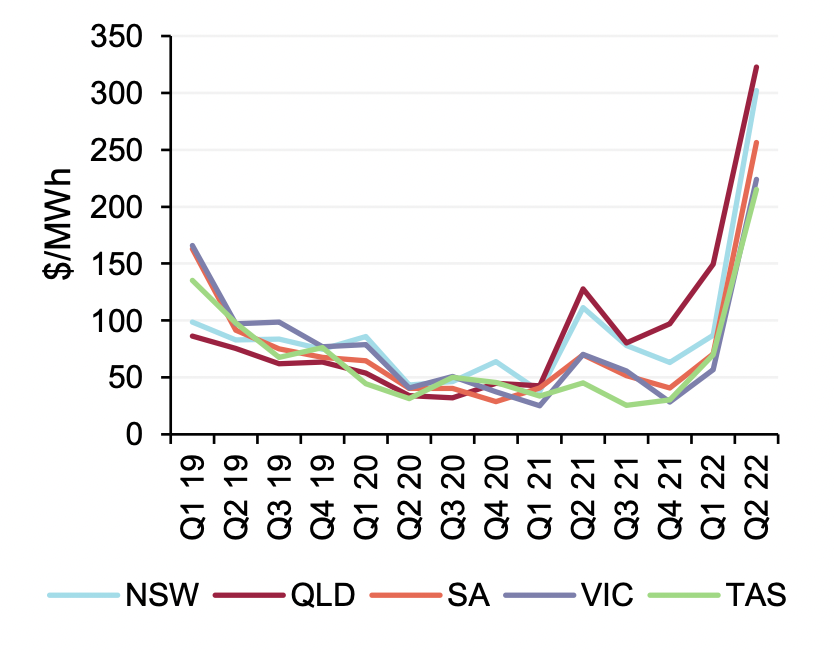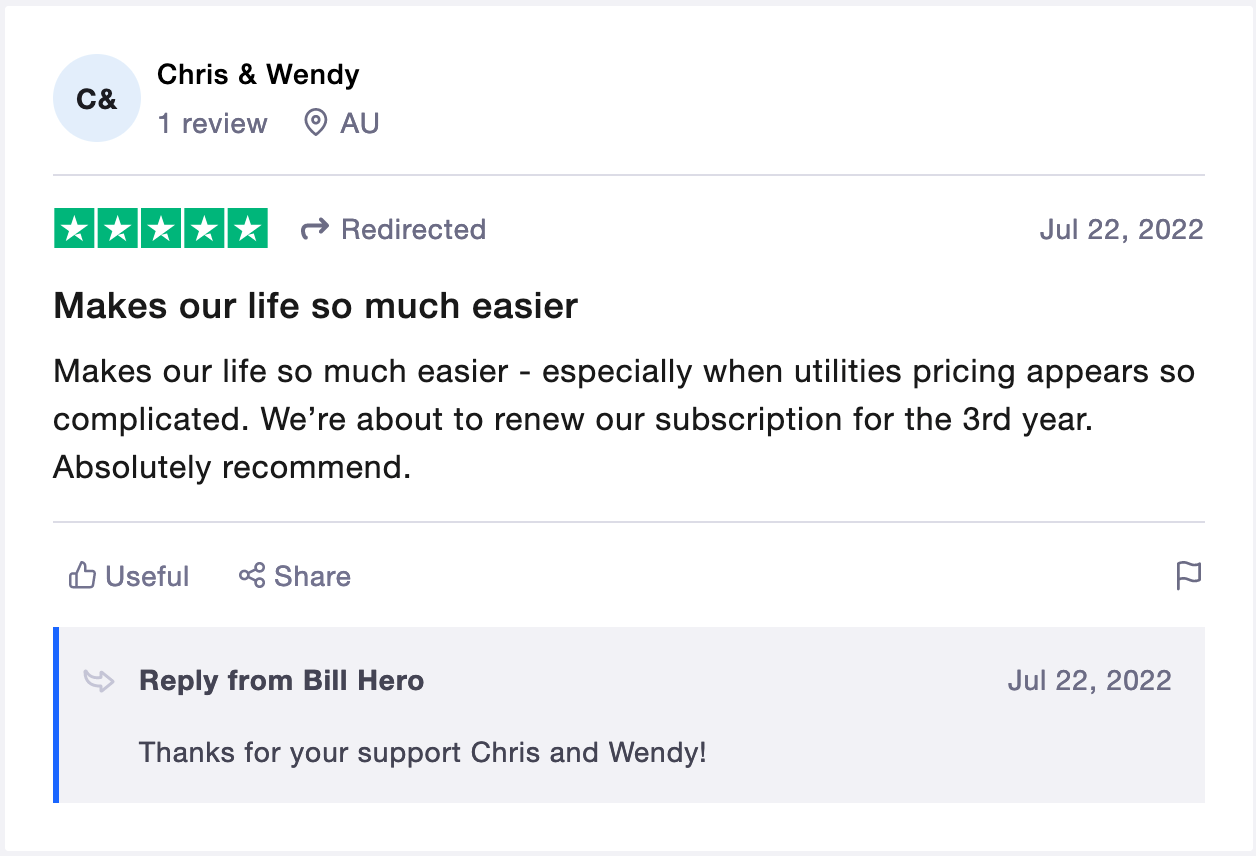Here's the game you didn't know you needed to play
Electricity distribution networks are complicated. So are the games based on them.
The Market Madness shows no sign of abating, but Bill Hero will help make sure you're always on the best priced plan, no matter what happens in the market.

Welcome to Issue #8 of Savings as a Service, the monthly newsletter from Bill Hero that helps you make sense, and save dollars, on your energy bills.
AEMO has recently published its Quarterly Energy Dynamics Report for Q2, 2022, and it will come as no surprise, that this quarter has been very 'dynamic' indeed.
The June quarter was an unparalleled period for Australia’s energy markets, with wholesale electricity spot prices averaging $264 per megawatt-hour (MWh) ... up by $177/MWh (more than 200%) on the previous quarter.

Wholesale price increases will inevitably mean retail increases, and Bill Hero is here to minimise the impact, by helping subscribers always stay on the best priced plans, no matter what happens in the energy markets.
If you're not already a Bill Hero subscriber, now's the time:

Never overpay for energy again! Bill Hero automatically compares every bill to help keep you always on the best priced plan.
Read on for more about what's happening in the retail energy markets, and how you can minimise your bills.
In our previous special Market Madness edition of this newsletter, we covered the sudden spiralling of wholesale energy prices. Since then, wholesale prices have only got worse, and we've seen unprecedented interventions in the market as a result.
A convergence of factors has driven recent wholesale electricity price increases, and has exposed significant issues with Australian energy policy and market structures:
The dramatic escalation in wholesale pricing triggered a market safeguard mechanism where AEMO, the market operator, imposed a price cap of $300 per MWh on 13 June.
Many generators withdrew their capacity from the market, in an 'economically rational' response to a situation where high input fuel costs and the imposition of a price cap made electricity generation notionally unprofitable.
This might make sense if they were literally facing the choice between generating energy at a loss, or not generating at all. But the market rules do include provision for compensation if this situation occurs. So why did the generators not keep producing, safe in the knowledge that even if they were operating at a loss due to increased primary fuel prices, they would have relief under the market price cap rules?
The answer is simple. By withdrawing capacity, they introduce immediate and urgent supply risk in the energy market, which opens a new set of tools for AEMO, including the power to direct selected generators to produce energy as required to supply the market. The rules allow for greater compensation to be paid in this situation than under the market cap.
So the energy generators played an 'economically rational' game of brinkmanship with the market operator, refusing to supply energy until specifically directed to do so. It is widely suspected that many generators artificially restricted their capacity to maximise their access to this compensation.
In response, AEMO shut down the entire National Electricity Market on 15th of June. This is the first and only time this has happened since the NEM was established.
For a week, the system ran almost as it did prior to privatisation: a central authority directly instructed the generators how much electricity to dispatch and when. The only difference is, those generators that ran at a loss during this period will have their costs covered through higher power bills. All up, this is expected to amount to about $1.5 billion, or $70 per household.
Unsurprisingly, this wholesale price upheaval has triggered unprecedented behaviour in the retail markets, including retailers actively encouraging their customers to leave and find another retailer, and some energy consumers experiencing multiple price increases in a matter of weeks in some jurisdictions.
Some new light has been shed on the news we covered in our previous special Market Madness edition of this Savings as a Service newsletter.
Back then, we'd just seen the extraordinary situation where some of the previously most competitively priced retailers had taken the unprecedented step to warn their customers to leave and find a new retailer.
Those retailers that took this drastic step couched their recommendation as a selfless act, intended to save their customers from inevitable steep price rises. Many commentators, including us here at Bill Hero, had assumed that those retailers must have been inadequately hedged against wholesale price rises, and had taken this path as a reluctant last resort.
The truth, as it turns out, is a bit murkier.
The Australian Financial Review reported that at least two of these retailers actually did have hedging arrangements in place which would have protected their customers from the price hikes. However, they had quietly sold these, for up to $100 million, while simultaneously creating panic in the retail market by urging their customers to leave.
This drastic step maximises their ability to weather the pricing storm, while retaining their retail licences, so they're able to re-enter the market at a future time. No doubt when they do re-enter the market, it will be accompanied by very vocal PR claims to be 'consumer friendly' since they'd actually persuaded their own consumers to leave for a better deal in the past.
Unfortunately for energy consumers, the buck always stops with us.
On top of escalating retail pricing, a new cost component is now looming. The estimated $1.5 bn in compensation payments made to the electricity generators throughout this extraordinary period, needs to be paid to the generators by the retailers.
Retailers cannot hedge against these kinds of compensation costs, so guess where they will find the required money? From our wallets, of course.
Even worse, the electricity market rules dictate that the amount of compensation paid by each customer is determined by their electricity consumption. This means people who have been able to afford rooftop solar and energy-efficient appliances will likely pay less than those who do not have these assets – including renters and low income earners.
This additional cost pass-through is expected to hit retail bills around Christmas time.
The outlook for energy bills is bad, but one silver lining is that increasing energy costs makes the economics for Solar even better than than before. Every kWh of consumption that you can offset with your own solar generation will now save you more, and will help accelerate the pay-back period for your solar investment.
Get your free Solar quotes to find out more about how Solar can work for you.

Bill Hero has partnered with SolarQuotes, the leading Solar quote provider in Australia, to help you get up to 3 no obligation solar quotes from fully qualified installers, absolutely for free.
Unfortunately, one of the the major themes in the news today is about Cost of Living impacts. Increases to energy prices affects everyone, and causes knock-on increases to pricing for pretty much every product and service economy-wide.
NSW has announceed a new set of Solar incentives
Now more than ever, with energy prices up, it's important to minimise consumption, and Energy Coach is here with more winter energy saving tips to help keep your consumption, and your bills, as low as possible.
Australian homes are notorious for thermal inefficiency, leading to excessive energy usage for heating or cooling. Here's our tips to improve things in your home:
Uncovered windows account for up to 40% of winter heat loss.
Seal all the gaps around all your internal and external doors
Sometimes when old appliances are removed the hole isn’t sealed.
It's expensive, and it takes time, but its inevitable that you'll need to replace your appliances over time, and you need a plan so you'll be better informed and more ready when the time comes.

Thanks Chris and Wendy!
Savings as a Service is the blog site and newsletter from Bill Hero. Subscribe now and get your energy savings tips and information delivered fresh to your inbox every month.